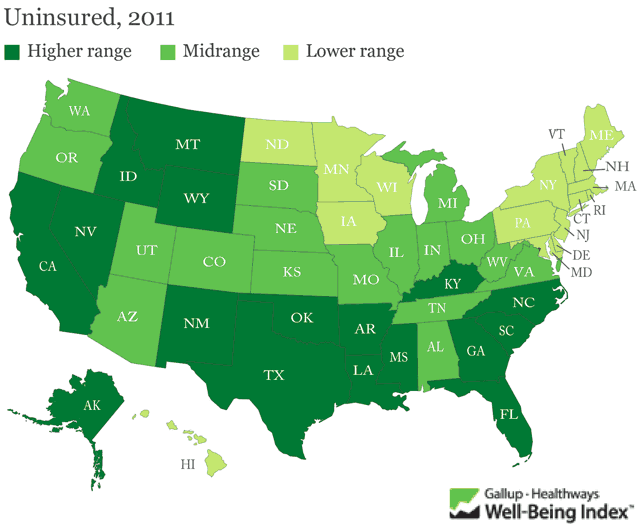Here’s a roundup of perspectives and analysis of yesterday’s Supreme Court Affordable Care Act decision.
A Defining Decision for Chief Justice Roberts
“Chief Justice John G. Roberts Jr. has a favorite quotation from one of the giants who preceded him on the Supreme Court. Assessing the constitutionality of a law passed by Congress, Justice Oliver Wendell Holmes Jr. once wrote, ‘is the gravest and most delicate duty that this court is called on to perform.’ In finding a way to uphold President Obama’s health care overhaul law on Thursday, Chief Justice Roberts performed the task with exquisite delicacy. That he did was a surprise from a judge whose rulings and background, including legal work in the administrations of President Ronald Reagan and the first President George Bush, suggested a conventionally conservative worldview… The legacy of the Roberts court came into focus on Thursday.” Adam Liptak, The New York Times
The Fate of the Uninsured Remains Embattled
“Tens of millions of Americans don’t have access to basic care for prevention and treatment of illness. For decades, there’s been wide support for universal health care. Finally, with the passage of Obamacare, two years ago, we did something about it. The law would provide coverage to people like those my friends told me about, either through its expansion of Medicaid eligibility or through subsidized private insurance. Yet the country has remained convulsed by battles over whether we should implement this plan — or any particular plan. Now that the Supreme Court has largely upheld Obamacare, it’s tempting to imagine that the battles will subside. There’s reason to think that they won’t.” Atul Gawande, The New Yorker
Pre-Decision Speculation and Post-Political Fallout
“To the extent there are marginal effects of the court’s decision, they would seem to be positive for Mr. Obama. The framework of the bill has now been endorsed by the court, including by John G. Roberts Jr., the relatively conservative and relatively well-respected Chief Justice who wrote the majority opinion… It is what passes for conventional wisdom that may have been the clearest loser with the court’s decision. Sentiment in prediction markets and among pundits had been that the law was more likely than not to be overturned… Statistical methods to predict the court’s decision, which have been more reliable than expert judgment in the past, had pointed to a case that was too close to call.” Nate Silver, The New York Times
Did Scalia’s Intransigence Move Roberts?
“Having already written half a dozen posts about the Supreme Court’s decision in the Obamacare case, over lunch I decided to dive into the dissent, authored by Antonin Scalia. It’s fairly remarkable…This is a very far-reaching dissent, and goes to show just how far four members of the court are willing to go. They didn’t choose the most restrained option, overruling only what they absolutely had to. They gleefully took a meat axe to everything, concluding that the only possible resolution was to completely invalidate the major provisions of the law, and then to invalidate the entire law… In fact, it’s possible that Roberts was initially willing to join the four conservatives, but then flipped sides when they implacably insisted on gutting the entire measure. If that’s the case — and there’s some evidence that it is — liberals were saved not by the force of their arguments, but purely by the intransigence of the court’s conservatives.” Kevin Drum, Mother Jones
Where the Uninsured Live
“Legal scholars are still parsing today’s complicated ruling, which upheld the mandate as a tax and precluded the federal government from withholding Medicaid funds from states that choose not to participate in the law’s Medicaid expansion. In that sense, there remains some uncertainty as to how the landscape of the uninsured might vary state-by-state once the law is fully implemented in 2014. Still, regardless of any potential variation in Medicaid expansion, one thing at last seems certain: This map of uninsured Americans will soon look very, very different.” Sommer Mathis, Atlantic Cities Blog
What’s In it For Me?
“The court’s decision to uphold all but one component of the health-care law means new rules for insurers that have already taken effect will remain in place. Beginning in 2014, virtually all Americans will have to obtain health insurance or pay a penalty. There also will be new opportunities to get coverage, including state-based marketplaces known as exchanges* (through which individuals will be able to purchase private plans that meet strict benchmarks for quality) and federal subsidies to help low-income people buy plans on the exchanges. The law will also expand the eligibility rules for Medicaid, but the Court found that states can not be penalized if they decline to comply with the expansion, raising questions as to how effectively the federal government will be able to implement it.” The Washington Post


